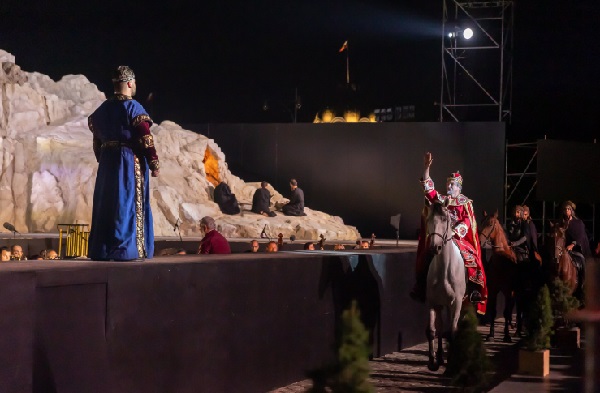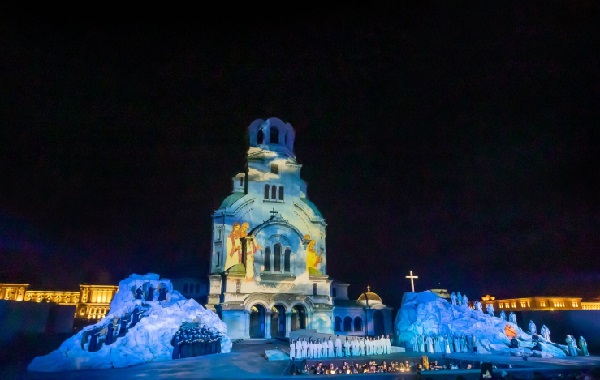Bulgaria, the culturally rich country on the Balkan Peninsula, reveals itself to be a fascinating opera country. Plamen Kartaloff, the visionary director, and his dedicated ensemble create true stage wonders with modest means. Almost 200 productions bear witness to his tireless creativity and the intense impact of his productions. After the resounding success of the Richard Wagner Festival, another remarkable production followed, which particularly touched the Bulgarian audience, as well as international visitors.
The premiere of the musical poem "The Hermit of Rila" took place against the imposing backdrop of the Alexander Nevsky Cathedral in Sofia on 26 July 2024. This work, which is half opera and half oratorio, was written by Tihomir Pavlov and set to music by Kiril Popov. To mark the 100th anniversary of the consecration of the cathedral, Sofia Opera presented this impressive piece, which is deeply rooted in Bulgarian history and spirituality.
The bells of the cathedral solemnly rang in the evening. Director Plamen Kartaloff thus revived an important tradition of opera in the square, which was established in the 1990s at symbolic locations in Sofia. The performances of "The Hermit of Rila" are not only dedicated to the 100th anniversary of the consecration of the cathedral, but also received the personal blessing of the newly elected Patriarch Daniil, which underlined the spiritual significance of the production and emphasised the solemnity of his presence.
"The Hermit of Rila" is a musical poem that tells the life story of St. John, an important Bulgarian saint. The production comprises two acts and ten scenes and is characterised by a mixture of operatic and oratorical elements. The work transports the audience into Bulgaria's past and reveals the country's deep spiritual and cultural roots.
 Photos: Copyright by Svetoslav Nikolov-Chapi
Photos: Copyright by Svetoslav Nikolov-Chapi
The author Tihomir Pavlov, born Aleksandar Aleksandrov Pavlov on 14 June 1880 in Kazanlak, revealed his talent as a writer at a young age. Pavlov's work "The Hermit of Rila" was written shortly before his death in 1937 and remained forgotten for a long time. It was only rediscovered in 2022 by Kiril Popov, who set it to music. Pavlov was a committed writer and journalist whose work was strongly characterised by Bulgarian history and national identity. His literary legacy includes poems, novels, short stories and historical studies.
Archpriest Kiril Popov, born on 5 December 1955, is an outstanding personality in Bulgarian church music. Popov has been active as a conductor and composer for decades and has composed over 100 church hymns and secular songs. With "The Hermit of Rila", he created a work that brings Bulgarian spirituality and history to life in an impressive way. Popov was present at the spectacle and his work was met with intense acclaim at the end. Georgi Strezov, who composed an excellent, multi-coloured orchestration, must also be mentioned at this point.
"The Hermit of Rila" is set in the golden age of Bulgaria, when the country flourished under the reign of the Tsars St. Boris-Michael, Simeon the Great and St. Petar. The story begins with the young St. John who, after the death of his parents, gives away his possessions to the needy and retreats to the solitude of the Bulgarian forests to lead a life of complete devotion to God.
The first act depicts John's entry into a monastery, his first spiritual experiences and his encounter with his brother, who tries to bring him back into secular society. His young nephew Luka seeks him out to stay with him. Luka's father brings his son back, who dies shortly afterwards as a result of a snake bite. John is deeply affected by this, but remains steadfast in his decision to dedicate his life to solitude and prayer. The second act shows John's deep prayer for the Bulgarian people and his encounter with Tsar Petar, who seeks his advice. John, who rejects all worldly possessions, prays for the welfare of his people and prophesies the building of a temple on the spot where his nephew Luka died. The work ends with the ascension of St. John and the centuries-long veneration of his relics in the Rila Monastery.
The performance took place in the evening against the impressive backdrop of the Alexander Nevsky Cathedral in Sofia. This monumental building provided a majestic and spiritually charged atmosphere befitting the work. With this production, Sofia Opera has created a new, deeply moving portrayal of the Bulgarian national saint. Plamen Kartaloff's direction was thoughtful and respectful of the historical and religious context of the work. Kartaloff created a staging that impressively conveyed both the historical significance of St. John of Rila and his message. The use of the open space in front of the Alexander Nevsky Cathedral provided a great visual backdrop. Emil Dinkov's lighting design was subtle and effective. It created the different moods of contemplation and drama that the work required. The highly effective multimedia projections by Vladimir Granchanov complemented the stage sets and visually emphasised the Bulgarian landscapes and the life journey of St. John. These projections were not only decorative, but also contributed significantly to the narrative density of the spectacle. For the first time, it was possible to project visual effects onto the cathedral. And they were fascinating visual worlds: icons, forest scenes, lightning and storms, the entombment, oversized candles. A fascinating flood of images.
 Photos: Copyright by Svetoslav Nikolov-Chapi
Photos: Copyright by Svetoslav Nikolov-Chapi
Alexander Nevsky Square offered a 50-metre stage that gave Plamen Kartaloff the opportunity to develop his creative scope as a director and scenographer. The decorations were made in the film studio in Boyana especially for this special production. The stage set, designed by Nela Stoyanova, was impressive with two huge rock massifs and impressively emphasised the hermit's path of development. The costumes, designed by Marta Mironska, were rich in detail and historically accurate. The robes and monks' cowls reflected the clothing of the 9th and 10th centuries and contributed to the credibility of the spectacle. Of particular note were the magnificent robes of Tsar Petar, which emphasised his royal dignity and the seriousness of his request for the hermit's blessing, and a real white horse was ridden by the figure of Tsar Petar on the stage in front of the cathedral, accompanied by four other riders.
The cast of soloists was high-calibre and contributed significantly to the success of the spectacle: Irinei Konstantinov as the elderly St. John of Rila was moving and believable. He impressively expressed the wisdom and peace that the hermit radiated. His speaking role was in harmonious dialogue with the sung parts, which brought the interactions on stage to life. Atanas Mladenov, a cultivated baritone with great charisma, gave the young hermit a powerful voice and convinced the audience with his intense portrayal of the saint's inner struggles and spiritual development. Veselin Mihaylov as the saint's brother brought out the turmoil and despair surrounding his brother brilliantly in his role. His powerful voice gave the quick-tempered character a resonant shape. The young Ivan Radev as his son Luka deserved special praise and was equally well received by the audience. With a pure boy's soprano and a great deal of dramatic commitment, his short life was particularly moving. With his majestic bass voice, Angel Hristov made an impressive King Petar, revealing the human side of the ruler in his dialogue with John. Nikolay Petrov as Father Auxentius, with his deep, warm voice, acted with great presence on stage. A worthy spiritual leader who shows the young John his way. The well-deserved bass Dimitar Stanchev was impressive as the voice of God. Stefan Vladimirov appealed with great sympathy and a soft bass foundation as the voice of the people. The many singers in the smaller roles were convincing with their high level of identification and vocal commitment.
The Sofia Opera Chorus, conducted by Violeta Dimitrova, and the orchestra, conducted by Metropolitan Cyprian of Stara Zagora, created a musical basis that supported the emotional depth of the work. The musical interpretation of the score was impressive and moving. Chorus master Violeta Dimitrova and the director of the children's singing and theatre formation Dimitar Kostanzaliev ensured that the choirs and children's voices were also perfectly integrated into the overall production. The orchestra interpreted Kiril Popov's compositions with great sensitivity and dynamism. The tonal language was rather contemplative, with many string passages in an orthodox style. In the large choral scenes, especially in the finale, the music built up to great apotheosis.
 Photos: Copyright by Svetoslav Nikolov-Chapi
Photos: Copyright by Svetoslav Nikolov-Chapi
This very special performance was an impressive spectacle, both musically and visually. Sofia Opera has made a significant contribution to the Bulgarian cultural landscape with this production, bringing the story of St. John of Rila to life in a way that was deeply moving and inspiring. The combination of historical accuracy, musical excellence and impressive direction made this performance an unforgettable experience. The textual qualities of Tihomir Pavlov and the musical composition of Kiril Popov resulted in a work that is both historically and contextually meaningful. The Sofia Opera under the direction of Plamen Kartaloff and the dedicated ensemble have revived a unique work of Bulgarian cultural history with this spectacle. The depiction of the life and deeds of St. John of Rila conveys a message of hope, selfless devotion and unshakeable faith. This musical poem is a testimony to Bulgaria's rich cultural tradition and a tribute to one of the country's greatest saints. The intense applause from the enraptured audience was correspondingly strong and persistent, as they immediately rose from their seats and paid lasting homage to the performers.
Dirk Schauß, 27 July 2024
Attended performance in front of the Alexander Nevsky Cathedral in Sofia
Kiril Popov Composer
The Hermit of Rila
Production: Plamen Kartaloff
Musical direction: Metropolitan Cyprian von Stara Zagora
Photos: Copyright by Svetoslav Nikolov-Chapi
https://onlinemerker.com/sofia-alexander-newski-kathedrale-der-einsiedler-von-rila-von-kiril-popov-nach-tihomir-pavlov-spirituelles-drama-und-grosse-buehnenkunst-in-sofia/
